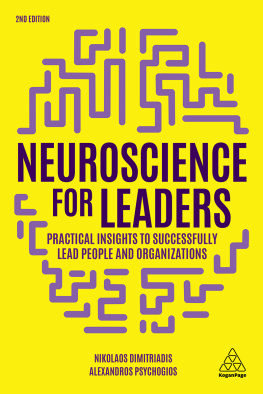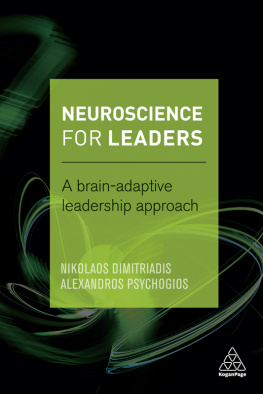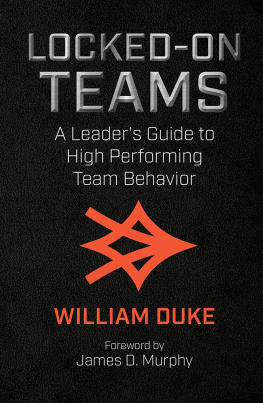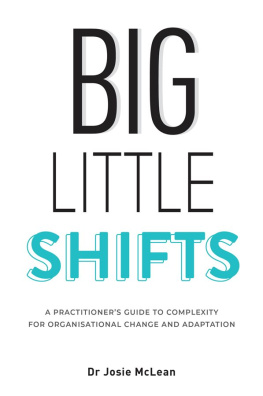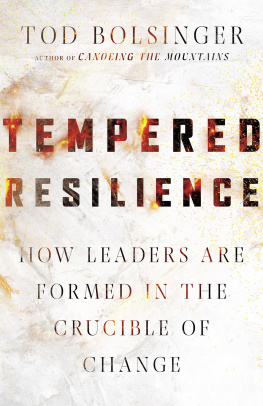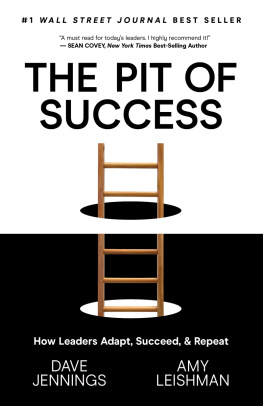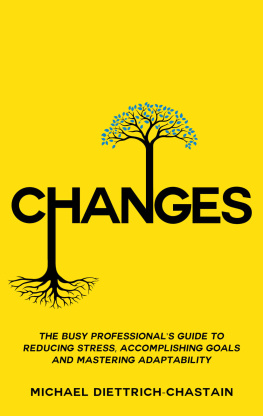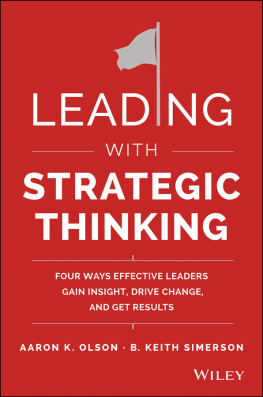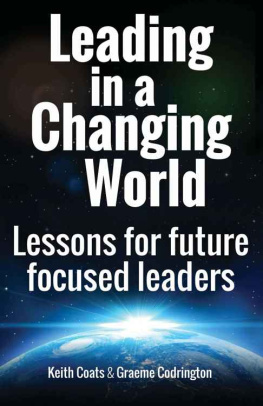For my dear husband, Nicholas; our precious twins, Josephine and Samuel; and for all the others who inspired and supported me on my journey to Deliberate Calm; and for everyone who is willing to give it a try.Jacqui
For my wife, Naina, and my three children, Kailey, Blaze, and Zoravar, with whom I continue to learn and grow every day.Aaron
For my parents, Jan and Ellen, who through their example of curiosity and interest inspired my lifelong love for learning and growth.Michiel
Ebook Instructions
In this ebook edition, please use your devices note-taking function to record your thoughts wherever you see the bracketed instructions [Your Notes]. Use your devices highlighting function to record your response whenever you are asked to checkmark, circle, underline, or otherwise indicate your answer(s).
Contents
Leaders are more powerful role models when they learn than when they teach.
ROSABETH MOSS KANTER
I n 2009, Captain Chesley Sullenberger illustrated what it means to practice Deliberate Calm in the midst of a crisis. When a bird strike cut both engines of his commercial flight soon after takeoff, he was facing the unknown, and the stakes could not have been higher. But he did not panic and, perhaps even more important, he did not rely on a standard playbook or protocol to give him a false sense of security. Instead, he recognized the situation he was in, mastered his internal response, and made the difficult yet necessary decision to reject the advice from air traffic control to return to the airport and to instead land the plane in the Hudson River.
This is Deliberate Calm in action.
As leaders, this may seem at face value like an unrelatable scenario. Most of us are not flying planes, nor do we have hundreds of lives in our hands. But more and more, we are tasked with the difficult job of balancing our emotions with a rational and deliberate thought process in the midst of chaos and uncertainty, if not in an actual crisis. When we are able to do this, we can catch early internal signals of distress, doubt, or fear without acting out a stress response that often makes the situation even worse. For a leader facing a complex business challenge, this can be the difference between adapting as needed to rise to the occasion and failing to adapt, missing opportunities to innovate, or worse. For Captain Sullenberger, it was the difference between life and death.
Deliberate Calm is not merely another book about a new or better style of leadership. The problem with claiming that one type of leadership behavior is more effective than another is that different styles are better suited to certain situations. But most leaders select their styles based largely on personal preference, on the latest fad, or worse, unconsciously, on ingrained patterns and habits. What we need, instead, is the ability and tools to thoughtfully address the situation and select the behavior that is best suited to our particular challenge or opportunity. This ability is becoming increasingly important, particularly when we need to learn and adapt. As the world has become more turbulent and volatile, adaptability has emerged as the number one critical capability for leaders.
However, it is difficult to adapt, and it is even more difficult precisely when it matters most. Adaptability, learning, innovation, and creativity are most challenging in high-stakes, uncertain situationsexactly when they are most needed. The human brain is wired to react to these situations with the exact opposite of learning and creativity, and this threatens to undermine our performance in the most critical moments.
Deliberate Calm is the solution. It is not a leadership style or behavior. Rather, it is a personal self-mastery practice that provides leaders with the awareness and skills to avoid reacting ineffectively and to instead choose the mode of thinking and acting that is most effective based on their current circumstances.
This book is evidence-based and combines cross-disciplinary research insights from neuroscience, leadership development, and team effectiveness. At its core, however, Deliberate Calm is a unique combination of four sets of skills applied to the context of leaders: adaptability, learning agility, awareness, and emotional self-regulation. Each of these skills is critical to the success and performance of leaders, but this is the first time they have been combined to help us learn and lead differently when it matters most.
A recent meta-analysis of empirical studies found that adaptability and learning agility were the top predictors of individual leader performance and potential. Coming in at number two was IQ or general intelligence, followed by job experience.
As far as we know, there is no existing research on what happens when leaders are taught adaptability, learning agility, awareness, and emotional self-regulation at once because outside of our work no such program exists. But the results of our work with leaders and organizations around the world are extremely compelling. When we deployed a program with 1,450 leaders at a global pharmaceutical company and compared their results to a control group, participating leaders showed an improvement that was three times higher than the control groups on a number of factors including performance in their role, successful adaptation to unplanned circumstances and change, optimism, and the development of new knowledge and skills. Furthermore, their well-being improved seven times more than the control groups. Best of all, the participating leaders only engaged in this program for thirty minutes a week over three months to achieve these results, which were based on self-reported data and assessments by colleagues.
Practicing Deliberate Calm is more important than ever. Our world is changing rapidly, forcing us to deal with unprecedented levels of uncertainty and volatility, both individually and collectively. More and more, we are tasked with making high-stakes decisions when our old methods and success models are not fit for the new challenges we are facing. Often, we dont know what will work or if a solution will ever be discovered, just as Captain Sullenberger could not have known whether or not his radical plan to land in the Hudson River would succeed.
This unfamiliar context is what we call the Adaptive Zone. In order to succeed in this zone, we must adapt, break free of our established patterns and habits, open our minds, learn new things, and even find new ways of learning and collaborating. In the Adaptive Zone, there is a tremendous opportunity for creativity, growth, innovation, and true transformation, but there is also risk of failure and stagnation if we fail to learn and change. It all depends on how well we navigate this zone and if we can avoid the natural tendencies that are likely to keep us stuck.
The circumstances that push us beyond what is known, safe, and predictable and into the Adaptive Zone often evoke feelings of fear. We are likely to unconsciously feel threatened and react by clinging tightly to our old ideas, success models, opinions, beliefs, and habits, all of which might not work in this new situation. In this contracted state, we tend to blame other people or circumstances for our problems and expect them to change instead of looking at how we can open up and adapt to the new situation, challenge, or opportunity.
It is not wrong to react this way. In fact, our brains and bodies are wired to interpret unfamiliar or unknown situations as potential threats, particularly if we perceive the stakes to be high. It is natural in the face of uncertainty and pressure to seek out the safety and familiarity of our established patterns and success models. However, just because we are wired this way doesnt mean it is effective. Our natural impulse to contract when facing challenges in the Adaptive Zone can lead to serious unintended consequences when circumstances require us to adapt. Ironically,
Next page

